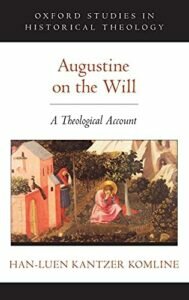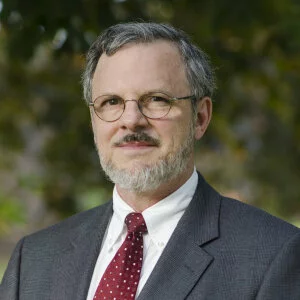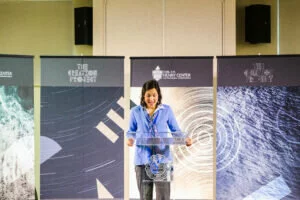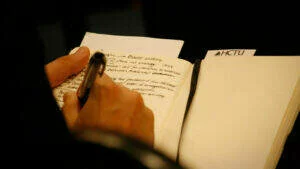The Premise: To Will Is Human; To Err, Also Human
The will is that part of our innermost self that expresses itself outwardly, in bodily action. It is the source of everything humans do other than by reflex. We typically view the will from a first-person perspective: “This is my choice I’m enacting.”
Yet how reliable is our sense of free will? The author Joyce Cary once observed, “The will is never free—it is always attached to an object, a purpose. It is simply the engine in the car—it can’t steer.”Joyce Cary, in Writers at Work: The Paris Review Interviews, ed. Malcolm Cowley (New York: Viking Press, 1977). By way of contrast, Shakespeare depicts Julius Caesar in complete command of his volition when, after refusing to go to the Senate House, he gives this explanation: “The cause is in my will; I will not come.”Shakespeare, Julius Caesar (Act II, Scene 2, Line 71). Contrast that sentiment with another J.C.: “not as I will, but as you will” (Matt 26:29). Many people may find it easier to identify with Paul rather than either Julius or Jesus: “I do not understand my own actions. For I do not do what I want, but I do the very thing I hate” (Rom 7: 15).
Questions concerning the will strike at the very heart of what it means to be human. Debates about the will, its bondage and freedom, and relation to nature and grace, echo through the centuries, dividing Reformed joints and Arminian marrow. Who or what is steering the will: human persons, genes, social forces, God? To get a handle on such questions, Han-luen Kantzer Komline returns to the fountainhead of the discussion in her Augustine on the Will: A Theological Account.
Questions concerning the will strike at the very heart of what it means to be human.
There are, of course, philosophical accounts, even of Augustine (whom Hannah Arendt describes as “the first philosopher of the will”).Hannah Arendt, The Life of the Mind: Volume Two, Willing (New York: Harcourt Brace Jovanovich, 1978), 84. Paul Ricoeur (not mentioned in Kantzer Komline’s book) wrote a trilogy on the philosophy of the will in order to answer the question, “What does it mean to be human?”See Paul Ricoeur, Freedom and Nature: The Voluntary and the Involuntary (Evanston, IL: Northwestern University Press, 1966); Fallible Man (Chicago, IL: Henry Regnery, 1960); The Symbolism of Evil (Boston, MA: Beacon Press, 1969). He dismisses Augustine’s account of original sin as a literalistic misreading, preferring to view the Genesis narrative as a symbolic expression of the inexplicable mystery of a human will that is both bound yet free. Although the will is not susceptible of direct inspection, the stories and histories we tell provide concrete evidence of the human “desire to be” and “effort to exist.” One of Ricoeur’s chief aims was to show that there is nothing in the human constitution that necessitates evil. Yes, there is a disproportion between our finite abilities and our infinite aspirations, but this inequity is not itself evil: philosophy discovers not fallenness, but fallibility.
The Puzzle: Simul Essential and Elusive
Kantzer Komline offers not a philosophical but theological account of the human, providing a coherent framework for Augustine’s varied writings on the topic. As such, it also counts an indirect response to Ricoeur’s critique.
The book begins by surveying the state of the question. On the one hand, clarifying Augustine’s understanding of the will is essential, for it lies at the heart of his thinking about several doctrines, including the image of God, sin, freedom, and grace. Gaining clarity on Augustine’s understanding of the will proves elusive, however, for several reasons. First, though we have an early work On Free Will, Augustine never provided a systematic account of the will as such. Second, scholars disagree about the sources of his understanding, the originality of his understanding, and the way he viewed the relation of volition to cognition and emotion. There is also scholarly disagreement over both his definition of freedom and the extent to which he may have changed his mind about the freedom of the will. Does freedom mean I can do what I want to do or that I can choose what I want to do (the issue at play in Augustine’s apparent change of mind in Ad Simplicianum)?
Clarifying Augustine’s understanding of the will is essential, for it lies at the heart of his thinking about several doctrines.
Kantzer Komline is aware of these debates, and diverse schools of interpretation, but with Solomonic wisdom chooses not to pick sides, preferring rather to merge chronological and thematic approaches, which enables her to account for both the development and integrity of Augustine’s thinking about the will.
The Proposal: A Dramatic Differentiation
Making good on her subtitle, Kantzer Komline contends that Augustine views the will in a theological context, related to God. How our human will relates to God’s will generates a kind of drama, “the story of God’s relationship with the human race” (p. 11). Her key move, as bold as it is insightful, is to attend to the various scenarios (theological contexts) in which Augustine speaks of human willing. The result is a “biblically indexed and theologically differentiated” account that describes the will in four different states, each corresponding to one of the four acts in the drama of salvation history.
Created: The first scene is, of course, Eden. As newly created, Adam and Eve were ante legem (existing prior to God’s law) and posse non peccare (able not to sin). Chapter One, “The Created Will,” examines human willing in its original state of integrity and traces the early development of Augustine’s thinking about the will’s character and capacities as divine gift. At this early stage, of both the human race and Augustine’s thinking, the mood is generally positive.
Fallen: Everything changes in the second, postlapsarian scene. Both the story and Augustine’s estimation of the human will darken, for humans have violated God’s command and are now sub lege (under law). Worse: in their fallen state, humans now sin necessarily, having lost the capacity not to sin. They are non posse non peccare, and hence on the wrong side of the law. Kantzer Komline notes that Augustine’s grasp of the impact of the fall on human willing was deepened not only by his repeated attempts to provide commentary on the early chapters of Genesis but, more particularly, “in the crucible of his struggle to interpret Paul” (p. 59). Romans 9:16 proved pivotal: “So then it depends not on human will or exertion, but on God, who has mercy.” The result: a grudging yet growing acknowledgement on Augustine’s part that the will is not merely stymied in its attempt to do the good one wills, but incapable of willing the good at all without God’s grace.
Redeemed: Everything changes again, this time for the better, as Augustine comes to see God’s grace as not simply assisting right human willing but, rather, as is its primary, and irresistible, motive power (ch. 4). As the object of God’s mercy, the will is no longer sub lege but sub gratia (under grace) and, once again, posse non peccare. A certain tension remains nevertheless: the converted will has been reoriented, but it is still susceptible to temptation and wrong desires. It has been planted in good soil (Kantzer Komline describes the redeemed will as “a root of love”), but to continue growing in goodness, it must depend on the transforming light of Christ and power of the Spirit (chs. 5–6): “The will is what it is in relation to the being and activity of the Christian God: Father, Son, and Holy Spirit” (p. 378).
Glorified: The fourth and final scene is future, when elect saints will be glorified and their wills achieve the perfect freedom of non posse peccare (inability to sin). Here it becomes clear that by “free will” Augustine understands more than freedom of choice (libero arbitrio). Adam and Eve had that, and look where it got them. No, the eschatological will is freer than the created will. The glorified free will for which Christians hope is God-like in its settled orientation both to do the good one wills and to will only what is good.
The glorified free will for which Christians hope is God-like in its settled orientation both to do the good one wills and to will only what is good.
The Payoff: Theological Theological Anthropology
“As soon as questions of will or decision or reason or choice of action arise, human science is at a loss” (Noam Chomsky).The Listener April 6, 1978. Indeed. Yet, as Pascal knew, “the heart has its reasons, which reason does not know” (Pensées). Augustine knows what Scripture tells him. In calling attention to different stages of the economy of redemption (i.e., the work of Son and Spirit), he achieves a theologically differentiated account, unlike Pelagius, who fails to register the difference between the created, fallen, and redeemed wills.
Kantzer Komline’s portrait of Augustine the thinker is therefore not that of a philosopher of the will, who has simply made Christian investments in Platonic or Stoic stock, but of a reader of Scripture who had to contend with the false teachings of Manicheism and Pelagianism. In describing Augustine on the will, she outlines what John Webster might term a theological theological anthropology, because from start to finish, Augustine thought about the human will first and foremost in its relation to God—or rather, in terms of its four relations to God. Augustine here appears as the fountainhead of the general tendency of subsequent theology “to read scripture as a drama with four acts,” (p. 11) and to read human experience, his own and others’, through a biblical-theodramatic lens.
Augustine thought about the human will first and foremost in its relation to God.
The will is nothing less than a movement of the soul, and the question at the heart of the biblical story, is simply this: will the soul move towards or away from God? What is this drama of the human will in its fourfold relation to God ultimately about? It is nothing less than a love story. Augustine, the paradigmatic pastor-theologian, is ultimately concerned with the desire of the heart, for “a person’s heart, what a person loves, is at the core of who she is” (p. 430). Accordingly, we can generalize Augustine’s advice to biblical interpreters: “choose the reading/willing most conducive to fostering the love/good of God and neighbor.”








Comments
Be the first one to make a comment!